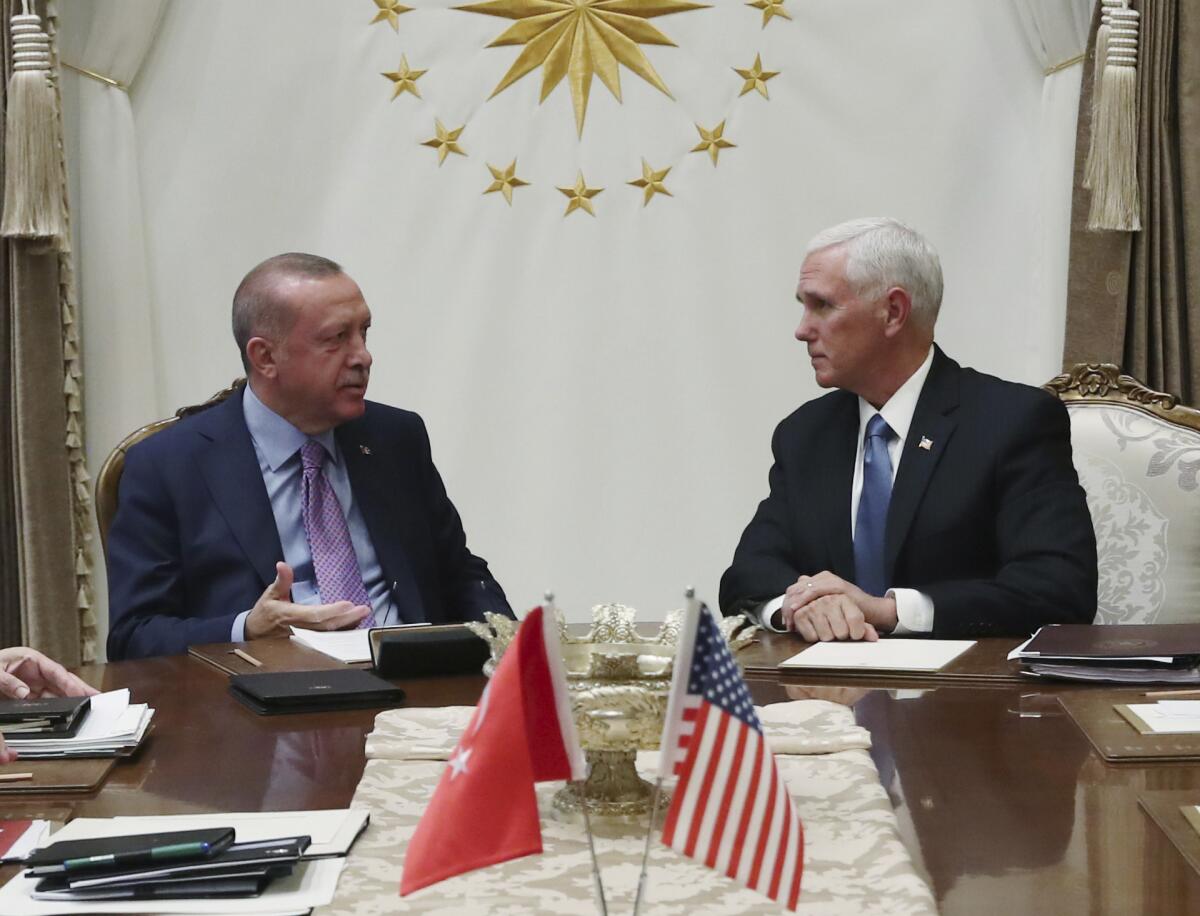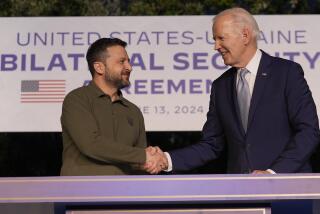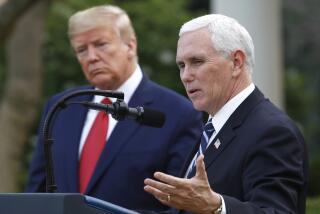U.S. agrees to deal approving Turkish control of northern Syria

ANKARA, Turkey — The U.S. and Turkey reached an agreement Thursday for a five-day cease-fire in Syria that will leave the Turks in control of a wide swath of Syrian territory, force U.S.-allied Kurdish militias to withdraw and require the U.S. to drop its newly imposed sanctions against Turkey.
The agreement, which Vice President Mike Pence announced at a news conference here, largely cements into place the gains Turkey made during its invasion of northern Syria over the last week.
Under the terms, Kurdish forces, which were allied with the U.S. in the fight against Islamic State militias in Syria and Iraq, will withdraw from a roughly 20-mile-deep zone along the border between Syria and Turkey.
Although the resulting “safe zone” will nominally remain part of Syria, the agreement specifies that it will be “primarily enforced,” by Turkish armed forces, according to the text released by the two sides.
Turkey’s foreign minister, Mevlut Cavusoglu, speaking separately, emphasized that the agreement was only a “pause” in the Turkish incursion into Syria, and that the Turkish military effort would end only after the Kurds had fully withdrawn and their military positions within the border zone were dismantled.
“We got what we wanted,” Cavusoglu said.
Turkish officials have fought for decades to suppress independence movements among the country’s Kurdish citizens and see autonomous Kurdish groups in neighboring Syria and Iraq as threats to their national security. Although the Kurds have been a major U.S. ally in the region, the agreement acknowledged the “national security concerns of Turkey” in relation to them.
The Turkish invasion of northern Syria began after President Trump agreed to withdraw a small contingent of U.S. troops who had effectively acted as peacekeepers in the border region. Pence, who had been dispatched quickly to Ankara to resolve a growing crisis that led the House on Wednesday to pass a bipartisan denunciation of Trump’s policy, insisted that the U.S. had achieved its main goal.
“We think the agreement today first ends the violence, which is what President Trump sent us here to do,” Pence said. “We’ve achieved that.”
Trump, speaking to reporters in Texas, hailed the agreement as “a great thing for civilization.” The Kurds “were incredibly happy with the solution,” he said. “It saved their lives.”
He also praised Turkey’s president, Recep Tayyip Erdogan.
“He’s a friend of mine, and I’m glad we didn’t have a problem because frankly he is a hell of a leader and a tough man, a strong man,” Trump said.
But the announcement brought a blistering denunciation from a leading member of Trump’s party.
“Are we so weak and so inept diplomatically that Turkey forced the hand of the United States of America? Turkey?” Sen. Mitt Romney (R-Utah), the Republicans’ 2012 presidential nominee, asked in a Senate floor speech.
“What we have done to the Kurds will stand as a bloodstain in the annals of American history,” Romney said, adding that “America is diminished, Russia, Iran and [Syrian President Bashar] Assad are strengthened. And so I ask, how and why this decision was reached?”
Democrats also sharply criticized the deal and the actions that led up to it.
“As we’ve seen again and again during his administration, the president is an arsonist who later pretends to be a fireman,” House Foreign Affairs Committee Chairman Eliot L. Engel (D-N.Y.) said in a statement that called for Turkey to “withdraw without delay” from Syria. Trump’s “actions have resulted in a loss for America, and a win for terrorists and America’s enemies,” Engel said.
Pence insisted that the agreement did not amount to an abandonment of the Kurds.
“Turkey’s had a great concern about their border. And while the United States of America did not approve of their military crossing into Syria, we have always endorsed a safe zone. And it was a matter of discussion and negotiations,” he said at his news conference.
“And we believe that the Kurdish population in Syria, with which we have a strong relationship, will continue to endure,” he said.
U.S. officials had been in touch with Kurdish militia leaders, and “we received repeated assurances from them that they’ll be going out, and they greatly welcome the opportunity for a cease-fire,” Pence said.
Pence avoided answering, however, when asked by reporters where the Kurdish forces would withdraw to. The Kurds have already allowed the Syrian government and Russian forces that are allied with it to move into some areas that had been under their control.
The agreement also does not say what protections, if any, the Turks would provide to Kurdish civilians if the militia groups pulled out of the border region. The Kurds have accused the Turks and their allied militias of having committed atrocities against civilian populations since the invasion began a week ago and largely pushed Kurdish forces back from the border.
Mazlum Abdi, a commander of the U.S.-backed Syrian Democratic Forces, the main Kurdish militia group, said in a telephone interview with a Kurdish television station in Syria that the group had been in contact with U.S. negotiators over the last three days and that his forces accepted the terms of the agreement.
“America has [brokered] this cease-fire, and is responsible for ensuring that it is carried out in the correct way,” he said.
Despite those questions, Sen. Lindsey Graham (R-S.C.), who strongly denounced Trump’s policy toward Syria and the Kurds earlier this week, gave the new agreement a tentative approval, writing on Twitter that “I stand ready to continue working with the president to build upon this breakthrough.”
Turkey, he added, “has legitimate national security concerns within Syria, but they cannot be met by invasion and force of arms.”
The Turkish incursion into Syria established facts on the ground that gave Pence and Secretary of State Michael R. Pompeo relatively little leverage in their talks with the Turks. Trump had already made clear that he wanted to bring the U.S. military role in Syria to an end.
Pence’s already difficult task became harder in the hours before he left Washington on Wednesday as Trump downplayed the increasingly violent conflict and showed little empathy toward the Kurdish forces, who have suffered heavy casualties.
Pence said at the news conference that the U.S. was “grateful” to the Kurds for the fighting they did in alliance with the U.S. against Islamic State. Trump had disparaged the Kurdish forces in comments he made Wednesday, comparing them to “terrorists.”
The agreement came after five hours of talks that began with a one-on-one meeting between Pence and Erdogan.
Pence arrived at the Turkish presidential palace just before 3:30 p.m. local time Thursday and was quickly ushered into the meeting with only Erdogan and two translators. The session, which was scheduled to be a 10-minute precursor to a longer expanded bilateral meeting including Pompeo and others, lasted more than an hour.
The high-stakes diplomacy came together in just days, after Erdogan suggested the possibility of talks in Ankara to resolve the escalating diplomatic crisis between the two countries.
Trump asked Pence to lead a U.S. delegation, sending him to meet with Erdogan even though there was no guarantee the conversation would lead to any real progress.
National security advisor Robert O’Brien arrived in Ankara on Wednesday, a day ahead of Pence and Pompeo, and has been working with Turkish counterparts to negotiate the terms of a potential cease-fire. During the 13-hour journey from Washington to Ankara, Pence spoke with Trump and other Cabinet officials. O’Brien, as well as James Jeffrey, the special envoy for Syria, took part in the expanded discussions.
When Pence landed Thursday, he was immediately faced with reports that Erdogan had told a Turkish news organization that he threw an Oct. 9 letter from Trump into “a bin.” The White House on Wednesday released the text of the letter in which Trump admonished Erdogan not to be “a tough guy.”
“You don’t want to be responsible for slaughtering thousands of people, and I don’t want to be responsible for destroying the Turkish economy — and I will,” Trump wrote.
The next day, Erdogan launched the military assault into Syria.
Times staff writer Melissa Etehad in Los Angeles contributed to this report.
More to Read
Get the L.A. Times Politics newsletter
Deeply reported insights into legislation, politics and policy from Sacramento, Washington and beyond. In your inbox three times per week.
You may occasionally receive promotional content from the Los Angeles Times.











